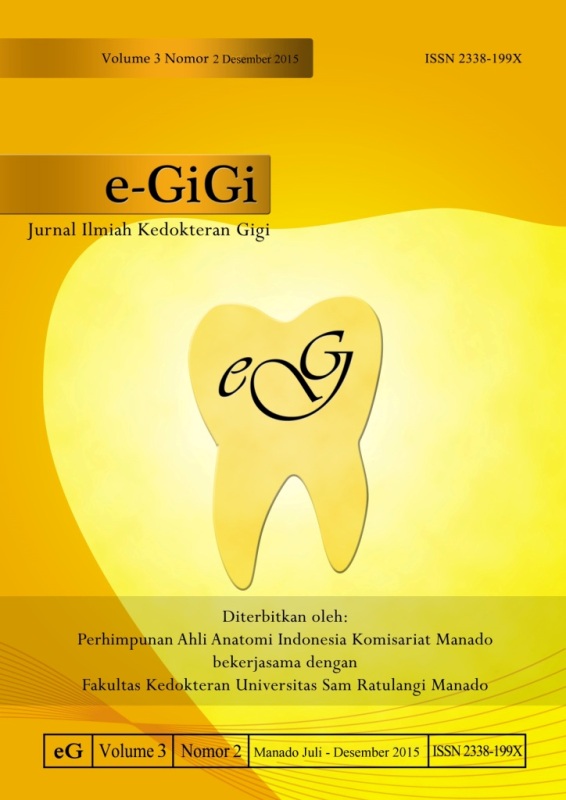PERBANDINGAN EFEKTIVITAS PASTA GIGI HERBAL DENGAN PASTA GIGI NON HERBAL TERHADAP PENURUNAN INDEKS PLAK GIGI
DOI:
https://doi.org/10.35790/eg.3.2.2015.10020Abstract
Abstract: Plaque control is an attempt to remove and prevent the plaque accumulation on the tooth surface. Brushing teeth is an effective method in controlling plaque. Plaque control is equipped by additional active ingredients in toothpaste form. The addition of herbal ingredients in toothpaste expected to inhibit the growth of plaque because it as the ability to inhibit the growth of microbes. This study aimed to compare the effectiveness of herbal toothpaste and non herbal toothpaste in reducing plaque index. This was a quasy experimental study using a pretest-postest group design. Thirty subjects were taken by simple random sampling method and divided into 2 groups. Fifteen subjects of first group used herbal toothpastes and 15 subjects of the second group used non herbal toothpaste. This study held on one day only. Plaque indices were recorded according to Loe and Sillness plaque index. Paired t-test was used to compare the effectiveness of herbal toothpaste and non herbal toothpaste in reducing plaque index. The result showed that there was statistically significant difference reductions of plaque index before and after intervention of both group. Paired t-test statistical test showed p=0,000 (p<0,05) that indicated there were statistically significant difference beetwen plaque index of brushing with herbal toothpaste and non herbal toothpaste. Conclusion: There was differences in effectiveness between herbal toothpaste and non herbal toothpaste in reducing plaque index. Herbal toothpaste was more effective to reduce plaque index.
Keywords: herbal toothpaste, non herbal toothpaste, plaque index
Abstrak: Pengendalian plak merupakan upaya membuang dan mencegah penumpukan plak pada permukaan gigi. Menyikat gigi merupakan metode yang efektif dalam mengendalikan plak gigi. Penambahan kandungan herbal pada pasta gigi diharapkan dapat menghambat pertumbuhan plak karena memiliki kemampuan menghambat pertumbuhan mikroba. Penelitian ini bertujuan untuk mengetahui perbandingan efektivitas pasta gigi herbal dengan pasta gigi non herbal terhadap penurunan indeks plak. Penelitian ini merupakan penelitian quasy experimental dengan rancangan pre test post test group. Tiga puluh sampel diambil dengan metode simple random sampling dan dibagi dalam dua kelompok. Lima belas sampel pada kelompok pertama menggunakan pasta gigi herbal dan 15 sampel pada kelompok kedua menggunakan pasta gigi non herbal. Penelitian ini dilaksanakan hanya dalam satu hari. Indeks plak diukur berdasarkan indeks plak Loe and Sillness. Uji t berpasangan digunakan untuk membandingkan perbandingan efektivitas pasta gigi herbal dengan yang non herbal terhadap penurunan indeks plak gigi. Hasil penelitian menunjukkan terdapat perbedaan yang signifikan penurunan indeks plak gigi sebelum dan sesudah intervensi pada kedua kelompok. Uji t berpasangan menunjukkan p=0,000 (p<0,05) yang berarti terdapat perbedaan bermakna antara penggunan pasta gigi herbal dan pasta gigi non herbal terhadap penurunan indeks plak gigi. Pasta gigi herbal lebih efektif menurunkan indeks plak dibandingkan pasta gigi non herbal.
Kata kunci: pasta gigi herbal, pasta gigi non herbal, indeks plak gigi
Downloads
How to Cite
Issue
Section
License
COPYRIGHT
Authors who publish with this journal agree to the following terms:
Authors hold their copyright and grant this journal the privilege of first publication, with the work simultaneously licensed under a Creative Commons Attribution License that permits others to impart the work with an acknowledgment of the work's origin and initial publication by this journal.
Authors can enter into separate or additional contractual arrangements for the non-exclusive distribution of the journal's published version of the work (for example, post it to an institutional repository or publish it in a book), with an acknowledgment of its underlying publication in this journal.
Authors are permitted and encouraged to post their work online (for example, in institutional repositories or on their website) as it can lead to productive exchanges, as well as earlier and greater citation of the published work (See The Effect of Open Access).






